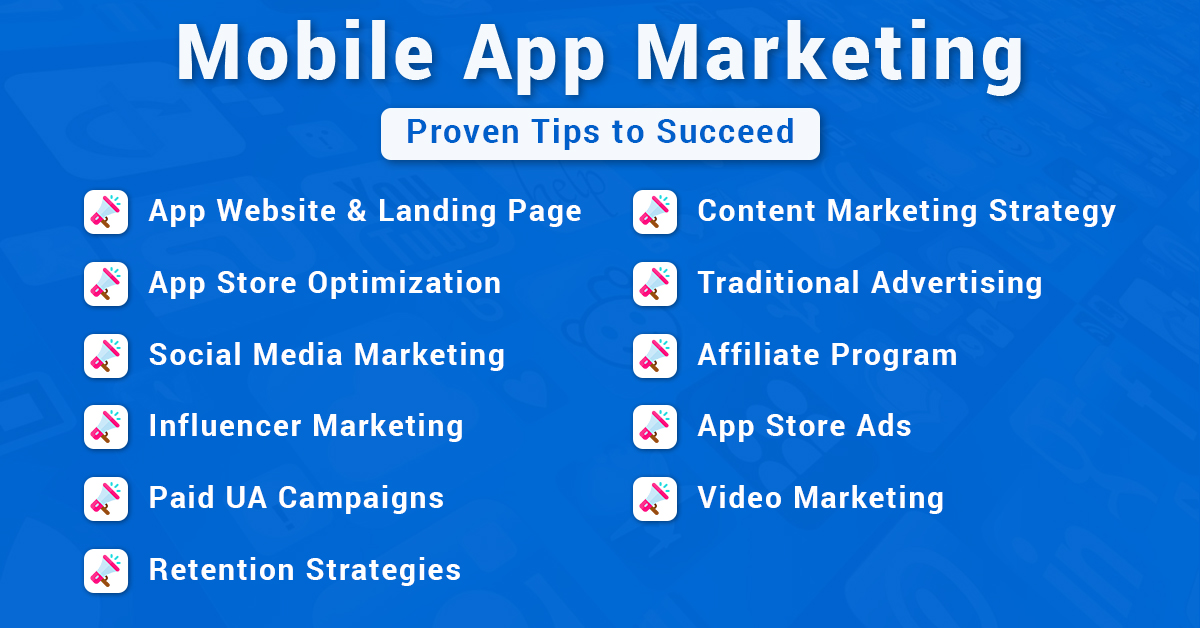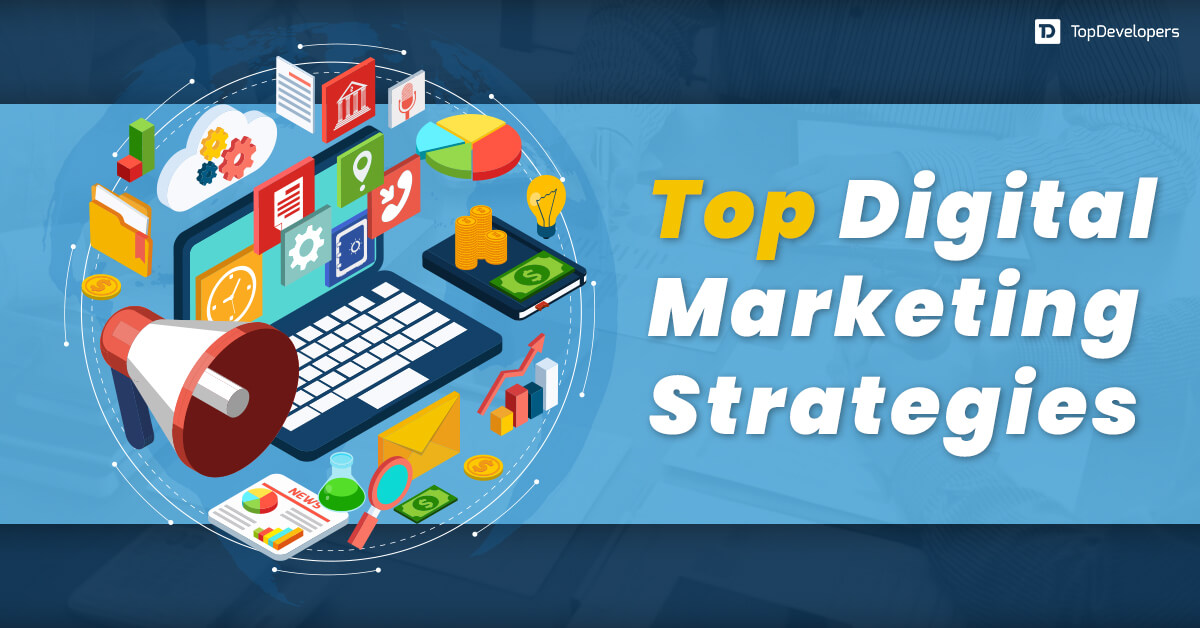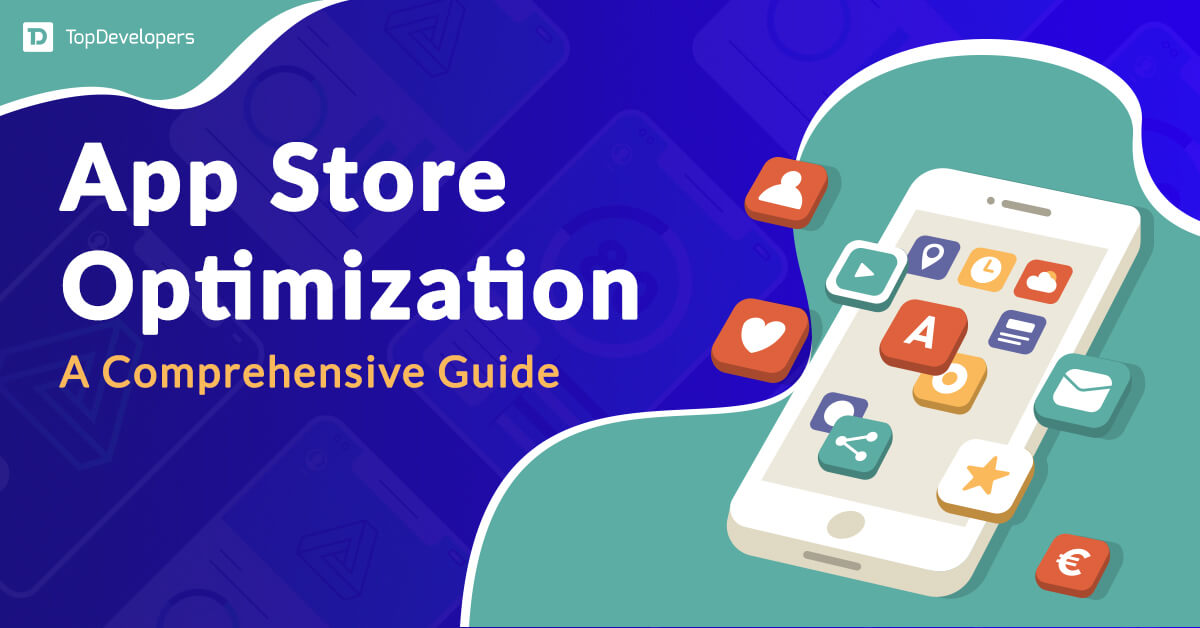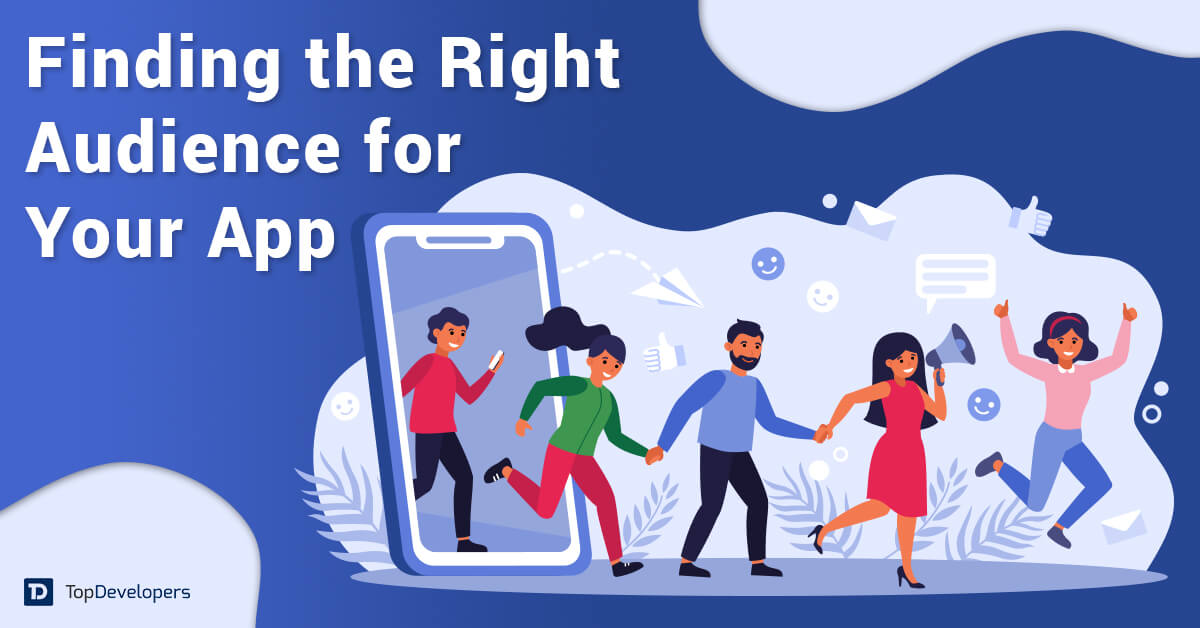
There are 8.93 billion mobile apps worldwide. And if your app doesn’t appear at the right places and to the right people, it simply doesn’t exist.
Mobile app marketing has become a necessity today. With the right strategy, smart customer acquisition process, and user engagement, you can make your app profitable and sensational.
But what is the right mobile app marketing approach?
How and where do we start?
Everyone has something to say about app promotion. However, putting all techniques to the test won’t give results.
In this blog, we have listed 10+ proven mobile app marketing strategies to help you boost your app’s online visibility.
Table of Contents
What Is Mobile App Marketing?
Mobile app marketing is the process of promoting and positioning your app in front of your ideal customers.
Similar to digital marketing, it involves target audience research, competitor analysis, keyword research, app store optimization, and marketing strategies tailored to your niche.
The core purpose of these techniques is to:
- Create awareness about your app
- Boost the app’s visibility
- Attract new users
- Retain existing users
- Engage users
- Build user trust and loyalty
Eventually, the main goal is to make your app successful by establishing it as an authority and credible brand in the niche.
Mobile app marketing strategy happens in 4 stages:
- Pre-launch
- Launch
- Post Launch
- Sustainability & Retention
At every stage, the marketing strategy is different as the goal differs. For example, pre-launch marketing strategies focus on creating awareness about your app. The content and strategies will make your target audience aware of your presence and showcase your app as an ideal solution to their problem.
What Are the Goals of Mobile App Marketing?
Every marketing campaign has a goal to achieve. It can be one primary goal coupled with supplementary goals that benefit businesses in the long run.
Similarly, when we talk about mobile app marketing, you can think of hundreds of goals that it targets. However, there are 4 main objectives that all app marketing strategies align to irrespective of the industry.
User Acquisition
The main objective of mobile app marketing at every stage is to acquire new users. With effective marketing strategies and content, you can ensure that your app is visible to the right audience.
The key to user acquisition is to address the user’s pain points and show how your app can solve them.
User Engagement
User engagement is as important as user acquisition. The secret to building a loyal user base is to interact with your customers.
Plus, the more user engagement, the more your app’s popularity will increase through.
Retention
71% of users stop using the app within the first 90 days of downloading. So, you see, user engagement and retention go hand in hand.
If you don’t keep your users engaged and don’t excite them with content, services, and upgrades, they will abandon your app.
Keeping users coming back for more is essential to sustaining your app. Plus, the higher the user retention, the higher be revenue.
Monetization
The end goal of all marketing campaigns is to entice customers to buy. Whether it’s in-app purchases, ads, or subscriptions to monetize your mobile app, your marketing strategy should be targeted at ultimately selling your products.
If your mobile app marketing is well-planned, you will convert your leads and boost revenue.
10+ Mobile App Marketing Tips For Your App’s Success
There are many mobile app marketing techniques that you can use to boost your app’s visibility.
However, not all marketing practices will give you the results you want. Plus, wasting your time and resources on unnecessary marketing methods will only delay the progress and growth of your app.
So, don’t rely on shortcuts or popular tactics. Here are 10+ expert-backed marketing strategies for mobile apps that deliver results.
Your App’s Website and Landing Page
Let’s get to the point – you need a website to build your online presence.
And your app is not an exception. A website is the perfect place to showcase your app’s features and benefits in detail. It helps you mark your presence in the search engines, attract users, and lure them to download your app.
Please note that your website creates your online impression. So, make it appealing and user-friendly.
Additionally, you can also use your app to describe your subscription plans in detail, offer discounts, and promote app-only features.
Having a website will contribute to your organic traffic and visibility. Moreover, if you are thinking of building your brand, narrating its story, and selling through it, then the website is the first step.
App Store Optimization
There are millions of apps on Google Play Store and Apple App Store. If your app doesn’t appear at the top of store search results, it will negatively impact your downloads.
Similar to SEO for websites, you need to optimize your app store profile to boost its ranking. You can do so by doing App Store Optimization (ASO). With ASO you can improve your app’s visibility and reach by using the right keywords, optimizing descriptions, and writing catchy titles and attractive visuals.
47% of Apple users find and download apps through app store searches and recommendations.
So, it is not only website SEO or social media marketing that can increase your app’s visibility or downloads. ASO plays an equally important role.
Social Media Marketing
What’s the best place to promote your app other than where people spend a major part of their day?
An average user spends 143 minutes a day on social media platforms. The duration varies with age, sex, and geographical location.
Teenager girls spend an average of more than 3 hours every day browsing through social media.
So, you can use the right marketing campaigns to target your ideal customers on different social media platforms.
But there are a few factors to consider.
First, not all social media platforms are ideal for all niches. For example, the travel industry gets exceptional results on Instagram and YouTube. While a B2B app will find its right users on LinkedIn and even Meta.
Second, you need to produce social media content that aligns with your users’ interests and latest trends. For example, Instagram reels and YouTube shorts are best for beauty and food apps.
Third, you can run ads on your targeted social media channels to garner more impressions and engagement.
Please note that your social media marketing should start months prior to your app launch. This will help you create a sensation in the market and build a user community eagerly waiting for the launch to give your app a headstart.
Influencer Marketing
How many times have you checked out or bought a product that your favorite influencer promoted?
Let’s be real. When an influencer talks about a product or uses it, we all get lured in to check what it is. And most of the time, buy it.
For example, you launch a fitness and nutrition app that tracks your diet and advises on how to get the right calorie deficit. Now a fitness influencer shows in his video how he goes on with his routine life and uses the app to track his nutrition, avoid binge eating, and maintain his ideal weight.
If this influencer has a decent following, the video will definitely reach all his followers. Most of these followers will be fitness freaks who are your target customers.
So, your app doesn’t just reach out to people. It reaches the right target audience, who have a high probability of downloading your app.
Pro tip – Choose influencers with a large follower base. Plus, collaborate with the ones who create content related to your industry.
Paid UA Campaigns
User acquisition strategies are a great way to acquire new users. Leverage Meta Ads, Google ads, YouTube ads, and Instagram ads to reach your ideal customers.
All you need to do is define your ideal user profile and then use the platforms’ ad campaign features to run your ads.
Ads are all about catching the attention of your users. So create stunning posters, infographics, and videos to grab the attention of the audience.
You can also monitor cost-per-install and return on ad spend to evaluate the performance of your ad campaigns.
Retention Strategies
Retention strategies make your users come back to you for more. The best way to retain your users is to personalize their experience. Recommend products and content based on their order history, usage, and interests. Another way to keep your users on the edge is through loyalty programs and rewards. Also, you can introduce gamification elements in your products and customer experience.
Push notifications are another tactic to stay visible to your users. It also helps you inform your users about the latest upgrades, profile changes, offers, and discounts.
To make your retention campaigns more effective, target inactive users. These are the ones that are on the verge of forgetting your app. So win them back with special offers and personalized messages.
Develop a Content Marketing Strategy
Content is the bridge between you and your users. It helps you address your users’ problems and inform them about your app’s features and benefits.
Plus content marketing is the key to narrating your brand story and relating to your user’s emotions. This is the best-selling strategy that big brands use.
For an effective content marketing strategy:
- Choose the digital platforms as per your industry
- Select the right mix of content types that performs well on your platforms
- Understand your target audience
- Do keyword research
- Create content pillars that align with your audience and goals
- Follow a content calendar to streamline your process
For a successful content marketing strategy, make sure your content is easy to read, valuable, and relevant to your audience.
Try Traditional Advertising
Traditional marketing isn’t dead yet.
Billboards in high-traffic areas frequented by your ideal user can create brand awareness. Include a clear call to action (CTA) like downloading the app or visiting your website for more information. Utilize QR codes on billboards to make downloading the app even easier.
You can also go for TV commercials during relevant programming to introduce your app to a wider audience. This is costly and only applicable if you have a fat budget.
Create an Affiliate Program
Affiliate programs show considerable success in acquiring new users.
- Identify top websites and apps in your niche that are not your competitors.
- Make a commission structure to give incentives to your partners.
- You can set per download rate in-app purchases or a hybrid model.
- Collaborate with your partners to discuss monthly performance reports and identify areas for improvement.
Run App Store Ads
Do you see sponsored or recommended apps when you open your app store?
Have you ever noticed stunning visuals of apps marked as “ads” running on your app store?
What a great way to be in the right place!
App store ads are better than social media ads. It’s because app store ads are more laser-focused on audiences who are looking for an app like yours.
So, if you have the budget, consider designing compelling ad creatives for your app store ad campaign.
Pro tip – Do not forget to optimize your budget allocation based on which keywords and creatives deliver the best results.
Captivate Your Audience With Video
Videos are more appealing than words. Plus, people tend to remember videos they have watched longer than words they have read.
So be it Instagram reels, YouTube shorts, video ads or longer video content, it’s going to attract users.
- Aim for high-quality video production
- Use professional images and audio for a polished look
- Include a CTA at the end
- Use client testimonials and reviews to create more impact
Videos are highly engaging and can effectively showcase your app’s features and benefits.
You can opt to create app explainer videos, demos, trailers, or user testimonials to grab attention on social media, app store listings, and your app and website.
Final Tips for App Marketing Success!
Mobile app marketing can help you build your brand, convert leads, boost app download rates, and increase user retention. If done the right way, an app marketing strategy can get you ahead of your competitors and monetize your app successfully.
But before you start with your mobile app marketing, identify your business goals, do a competitor analysis, understand your audience, and set a budget.
Only then can you plan and execute winning mobile app marketing strategies to make your app rank top in the industry.
Most Asked Questions about Mobile App Marketing
What is app marketing?
App marketing includes all the planning and strategy creation that improves the app’s visibility, engages and convinces users with USP, and differentiates the application in the market.
How can I better market the mobile app?
There are various ways for mobile app marketing includes-
- Perform customer research and then reach out to them accordingly.
- Start marketing the app idea ahead of its development.
- Create content regarding the app’s core idea and publish it as blog or website banners.
- Market the app idea socially or take the help of influencers.
- Email marketing also helps you gain major traction.
How can I attract the maximum number of users to the app?
It includes different strategies that can help you-
- Publish website banners
- App store optimization
- Create infographics
- Launch paid campaigns
- Enable referral program
- Run influencer campaigns
- Publish PR and promote it on traditional channels
- Others
How do apps acquire users?
Businesses can increase user acquisition using various marketing strategies such as organic traffic, paid advertising, app store optimization, social media marketing, and more.
 Avantika Shergil
| May 27, 2024
Avantika Shergil
| May 27, 2024
Avantika Shergil is a technology enthusiast and thought leader with deep expertise in software development and web technologies. With over 8 years of experience analyzing and evaluating cutting-edge digital solutions, Avantika has a knack for demystifying complex tech trends. Her insights into modern programming frameworks, system architecture, and web innovation have empowered businesses to make informed decisions in the ever-evolving tech landscape. Avantika is passionate about bridging the gap between technology and business strategy, helping businesses build customized software and website, and understand about different tools to leverage effectively for their ventures. Explore her work for a unique perspective on the future of digital innovation.







